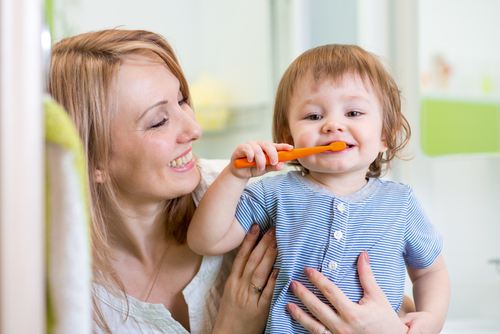A Baby’s Oral Health Begins at Birth

Your child’s 20 primary teeth are already present in the jaw when they’re born. Even though these 20 tiny chompers will be falling out in the coming years, it’s still important to protect them and keep them clean. Your ability to keep an excellent oral health routine for your baby may just lay the foundation for their oral health when they’re in their 20’s, 30’s, and so forth. That’s why it’s important to brush and clean your baby’s mouth, even if they may not have any teeth just yet!
BC – Before Chompers
It may seem silly to clean a child’s mouth before they even have any teeth, but it is necessary. Milk, formula, and juices contain a lot of sugar. This sugar can help feed any kind of bacteria that may linger on your child’s gum. In order to properly clean their gums, you can use a wet washcloth or wet gauze pad to gently brush their gums. This will help wipe away whatever nasty bacteria may be lingering in your child’s mouth. The cool washcloth may even help sooth your baby’s gums if they are teething.
First Tooth
When the first tooth pops up, be sure to clean it twice a day. Much like your full set of teeth, it’s required that your baby’s tooth is brushed once in the morning and once before they’re going to bed. Of course, you’ll be brushing fewer teeth than what you’re used to but don’t be lazy about it! Keeping your child cavity free when they’re a one year old can keep them cavity free their whole life. The quicker they learn the important of a strict oral health routine, the better!
When brushing their first tooth, make sure you’re using a specialty toothbrush created for infants and babies alike. It uses much softer bristles, so it’s not as rough on their sensitive gums. It’s also unnecessary to use toothpaste at this stage. Babies, although they like to drool, don’t quite understand the concept of spitting on command, so they might swallow the toothpaste. It’s not entirely dangerous to them, but it’s not entirely safe either. Water will do the trick until they turn 3.
It’s also important to schedule their first pediatric dentist appointment at this point. Even if the baby hasn’t had a tooth emerge just yet, they should see a dentist by the age of one. That is what the American Academy of Pediatric Dentistry suggests, as it readies a child for a lifetime of dental appointments and teeth cleanings from an early age. It’s always good to prepare!
First Set of Teeth
Around the age of 2 or 3 your child’s primary teeth should all be set. If they’re not, it’s no big deal! Kids’ teeth develop differently. There is no set schedule just a guideline. However, around this age, they should have the dexterity to brush their own teeth. Make sure they’re applying a pea-sized amount of fluoridated toothpaste to their brush. You’ll also need to oversee their brushing. Kids tend to brush all of the easy spots but nothing else! Make sure they’re brushing behind their teeth, as well as reaching those molars in the way back.
At this stage, they should also be flossing once a day. Again, this is a build up in order to create long-lasting oral health routines. You don’t want your kids neglecting their oral health when they’re teenagers, in their twenties, and beyond. Toothaches, cavities, and root canals all add up to missed time at school, at practice, or at work. Not to mention, after your primary teeth fall out, you only get one more set of teeth. Make sure your child is able and willing to care for them, which starts with you. A baby’s oral health begins at birth!
See More Staff Members See More Questions and Answers See More Testimonials